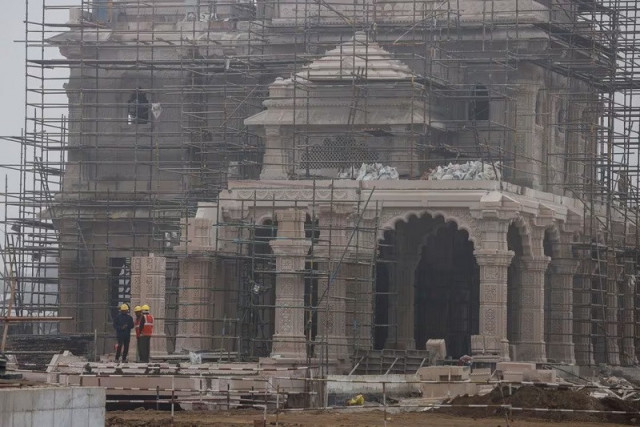Archeological site : Outcry over attempted demolition of temple
Contractor claims ETPB approval for razing structure

An attempt to demolish a historically significant abandoned Hindu Temple in Dagai village of Swabi district sparked widespread criticism and garnered attention on social media platforms.
This temple, believed to be over 200 years old, stands as a remarkable example of Indian and Victorian architectural craftsmanship. Sadly, it has remained abandoned since the partition of Pakistan in 1947.
Local residents told The Express Tribune that last Wednesday, a leaseholder initiated efforts to demolish the temple situated in Tehsil Razzar. However, swift intervention from the community halted the operation, prompting them to notify both the district administration and the archaeology department about the concerning development.
Upon receiving the report, authorities responded by visiting the site and issuing an order to close it until further notice. An inquiry has been initiated, and authorities have instructed strict legal action against the leaseholder responsible for the attempted demolition.
Conversely, the contractor claimed to have obtained a No Objection Certificate (NOC) from the Evacuee Trust Property Board (ETPB) for the demolition of the temple. This assertion was presented to the local residents, who responded by staging a protest demonstration against the demolition efforts.
Historical evidence
According to historians, the district Swabi has remained a hub of Buddhism and Hindu religions in ancient times.
In pre-partition India, the vibrant Hindu trading community flourished, leaving a rich cultural legacy evident in the construction of 65 temples across the district. These temples were predominantly situated in urban areas and trading centers, serving as focal points for both religious worship and economic activity.
Among these temples, one stood out for its modernity, size, and comprehensive facilities. Nestled in Dagai village, Tehsil Razzar, it boasted not only a grand architectural design but also included residential quarters and a schooling section, complete with ample parking space.
However, following the partition, the fate of this temple took a different turn. Its premises were repurposed as a primary school, serving the educational needs of the local community for decades. Later, as the dynamics shifted, the temple’s building was entrusted to the village’s post office. Eventually, after the post office relocated, the once-thriving structure fell into disrepair.
Official version
According to the district administration’s official version, a local resident of Mardan has obtained a lease for the temple premises for a specified period, agreeing to pay Rs2,700 per year.
A member of the Evacuee Trust Property Board (ETPB) revealed that they had received multiple requests advocating for the demolition of the temple due to its deteriorating condition.
However, Muner Gul, a local social worker, vehemently denied such requests, asserting that the temple holds significant heritage value for the villagers, who are determined to preserve it at any cost.
In a report submitted to the Supreme Court Islamabad bench by the Dr. Shoaib Suddle commission, it was highlighted that out of the 365 temples, only 13 were under the management of the board. This leaves the responsibility for the upkeep of 65 temples solely with the Hindu community.
Published in The Express Tribune, March 11th, 2024.



















COMMENTS
Comments are moderated and generally will be posted if they are on-topic and not abusive.
For more information, please see our Comments FAQ